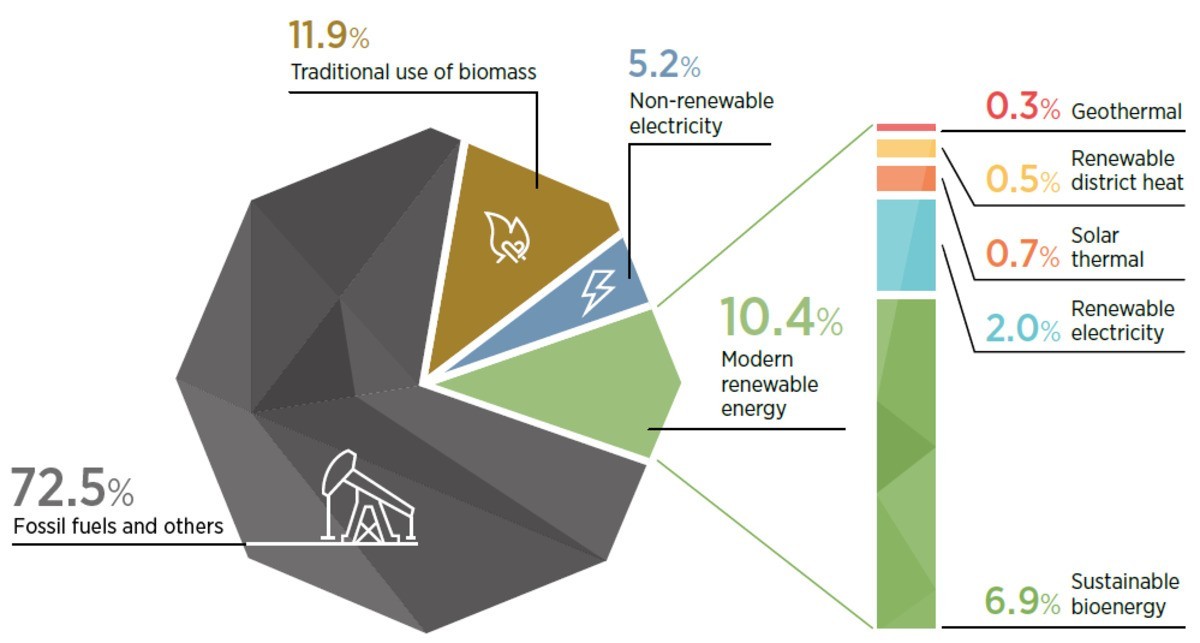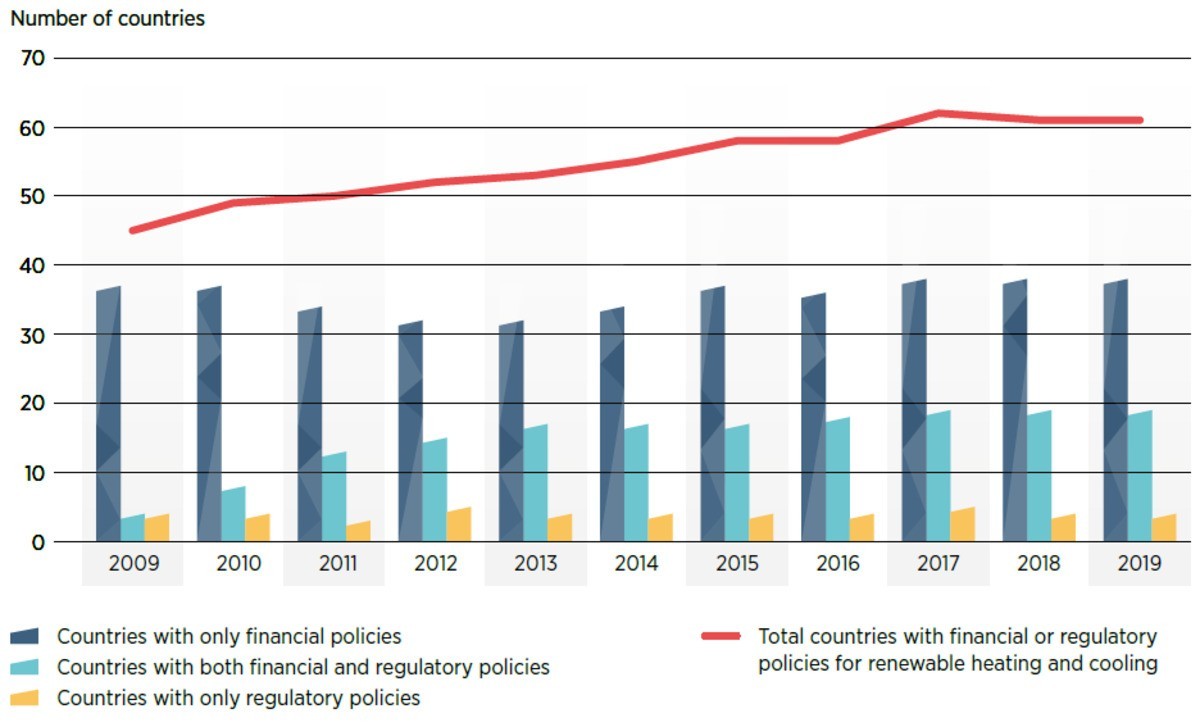Widespread benefits at hand with renewables in heating and cooling, but needed policies are missing in action
D2Grids Project
Effective and ambitious policies are urgently needed to unlock the widespread benefits offered by using renewable energy in buildings and industry. As fossil fuels persist as the main fuel for heating and cooling, releasing harmful particulates, worsening air pollution and contributing to greenhouse gas emissions.
With this pressing need in mind, IRENA, IEA and REN21 have joined forces again to produce a report on the status and developments of policies for renewable heating and cooling.
Around half of the globe’s energy is used for heating and cooling our homes and offices, cooking food, manufacturing materials and producing goods. Collectively all these uses generate 40% of the energy sector’s CO2 emissions. At the same time, 2.8 billion people still lack access to clean, reliable solutions for their heating needs.
The use of renewable energy to meet heating and cooling needs provides multiple benefits. Among them, it reduces air pollution and related health impacts, decreases greenhouse gas emissions, lessens energy poverty, and increases energy security. In a context where people lack access to clean and reliable energy, renewables reduce indoor air pollution, improve livelihoods and enhance community welfare.
These benefits include clean, local jobs. In 2019, 11.5 million people were employed in the renewable energy sector and this workforce could reach 42 million by 2050. As the world continues its economic recovery, renewables, along with energy efficiency measures, are some of the investment options providing the most jobs per unit of spending.
But shifting to renewable heating and cooling is challenging: to-date, only 11% of the globe’s heating and cooling needs in buildings and industrial processes are supplied by renewable energy. And progress is stalling. Renewables-based heating is expected to decline in 2020 because of the pandemic.

Political and institutional changes are urgently needed to accelerate the transition away from fossil fuels. Unclear and inconsistent policies undermine willingness to invest in renewable heating and cooling technologies and in the necessary infrastructure including gas grids, power grids and district energy systems. Persistent and unconditional political support for fossil fuels means that the playing field between renewable energy and fossil heating fuels is far from level.
Rabia Ferroukhi, Director of IRENA’s Knowledge, Policy & Finance Centre, said,
“Without a strong and clear political will to drive the transition, clean and efficient renewable heating and cooling solutions would not be accessible for households, industries, and other users. Such a transition is crucial as to reduce emissions and pollution, and to stimulate local economies and create sustainable jobs. Clearly defined political commitments, such as renewable energy and energy efficiency targets in countries’ NDCs, supported by comprehensive long-term planning have a key role to play.”
Addressing the institutional barriers is paramount. Existing subsidies for fossil fuels in the energy sector distort the market and can squeeze out renewable energy solutions – yet a phaseout of these subsidies must ensure equitable outcomes for all members of society. Carbon pricing policies further encourage a level playing field, as they internalise the negative external costs of fossil fuel production and use.
Renewable heating and cooling solutions also are facing economic barriers, such as high upfront costs, and are struggling to make headway in an environment with low consumer awareness, few clear financial incentives and an absence of credible, long-term policy signals. Policy attention and support for renewable heating and cooling remains critically limited on a global scale.
Paolo Frankl, Head of IEA’s Renewable Energy Division, underlined the point:
“The technologies needed to decarbonise many heating and cooling end-uses already exist. What’s more, we know good examples of policy instruments that can bring down costs and help provide global access to clean and reliable renewable heating and cooling services. Now these policies must be put in place at scale.”

One way to encourage the use of more renewable heating and cooling in the global economy is to put in place effective policies where the energy is being used: in buildings and industrial processes.
Only 30% of all countries have mandatory building energy codes in place. Governments should implement more and strengthen existing codes for new construction and refurbishment of existing buildings. Coordination between national and local governments is also necessary to ensure that building-related policy mechanisms at different governance levels complement each other.
REN21’s Executive Director Rana Adib added,
“Setting targets is one thing. But governments will never reach these goals without the policies that encourage more renewable energy use in our homes, office buildings and industries. I am confident that policy makers can find the necessary tools in this report.”
Policies for industrial processes are necessary as well. Establishing an ambitious, clear and long-term framework for the development of a renewable gas industry will be vital to growing the use of biogas, biomethane and hydrogen in manufacturing. With appropriate policies fostering innovation and cost reductions, the production of renewable hydrogen for industry can likewise become a cost-effective way to use renewables in hard-to-decarbonise processes.
Finally, governments and the international community must collaborate to enhance universal access to clean and reliable energy services. Fiscal and financial support, along with capacity building to strengthen local supply chains could help to scale up the renewables heating and cooling for agri-food industries and promote cleaner cooking for people lacking access to modern energy services.
Some national and local governments are taking action. Policy movement on a global scale, however, is lagging. Current measures are insufficient to take full advantage of the widespread benefits of renewable heating and cooling. Governments must introduce more comprehensive and well-crafted policies that put efficiency and renewable energy first, while executing a careful, society-sensitive phaseout of fossil fuels.
Among many others, this study recommends the following policy measures:
- Raising the ambition of NDCs and setting related renewable heating and cooling targets
- Creating long-term, integrated energy plans for heating and cooling
- Coordinating national and local governments to ensure that effective policy instruments at different levels are complementary
- Pursuing the strategic phase-out of fossil fuel subsidies and implementing fiscal policies (including carbon pricing policies) to level the playing field for renewables
Article by Duncan Gibb
This publication first appeared on the REN21 website
Read the study here: IRENA, IEA and REN21, Renewable Energy Policies in a Time of Transition: Heating and Cooling.




